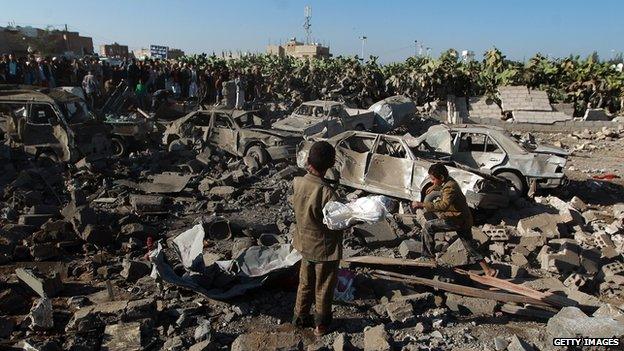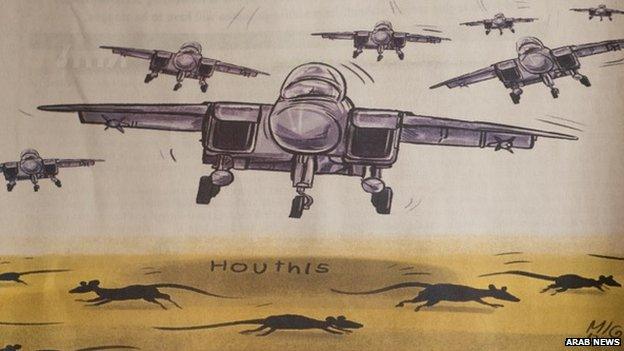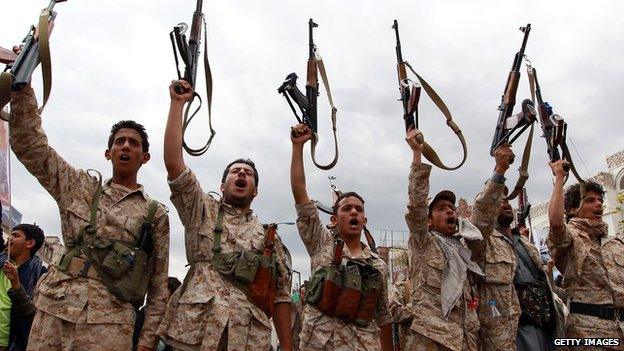Yemen crisis: Where does Saudi offensive go next?
- Published

Unicef says at least 62 children have been killed in the past week of fighting
The Saudi-led Operation Decisive Storm against Houthi rebels in Yemen is ending its first week with no sign of a let-up in air strikes.
At least 35 civilians were killed on Tuesday night in an attack on a dairy factory suspected of being used by rebels as a weapons cache, although the cause of the deaths was unclear.
Unicef says at least 62 children have been killed in the past week of fighting. So what are the Saudis hoping to achieve and how will it end?
The campaign will continue, said Saudi Foreign Minister, Prince Saud al-Faisal on Tuesday, until the legitimate government is back in power.
That government is now effectively in exile, with the defiant President Abdrabbuh Mansour Hadi being hosted by his Saudi allies here in the capital Riyadh.
Yemen's foreign minister has called for a ground offensive to push back the rebels from territory they have seized since September, something the Saudis have not ruled out.
"All options are on the table," the Saudi ambassador to London told me this week.
Every evening the Saudi military holds a press briefing at their Riyadh airbase. Their spokesman, Brig-Gen Ahmed al-Asiri, fields questions in Arabic, English and French.
There is monochrome cockpit footage of guided air-to-ground missiles hitting their targets across Yemen.
A PowerPoint slide lists the objectives of the 10-nation coalition's air campaign as targeting:
Ballistic missiles (Scuds)
Air defence Missiles
Ammunition storage Depots
Troops on the move
Rebel Supply Lines
And finally surveillance of the 1,000km-plus Saudi-Yemeni border.
The largely government-controlled press is backing the campaign unequivocally. "They had it coming," said an op-ed in Wednesday's Arab News, with a large cartoon of warplanes scattering rats in a desert. One Saudi journalist told me: "We see this as brotherly support for our neighbours in Yemen".

Saudi Arabia's government-controlled press has backed the campaign against the Houthis unequivocally
Digging in
The offensive began on 26 March and the Saudi air force, supported by Gulf Arab partners and US intelligence, quickly gained total air supremacy.
The Yemeni air force jets used by the rebels to bomb the UN-recognised president in his palace in Aden have all been destroyed on the ground.
So have the Scuds that were used with such devastating effect in Yemen's civil war in 1994, and which the Saudis feared could have been launched against their cities.
The Houthis, who are allied with Yemen's ousted former President Ali Abdullah Saleh, have seen their advance across the country checked in places, but on Wednesday night there were reports that their tanks had entered the port of Aden amid fierce skirmishes.
This week they seized the Indian Ocean port of Shaqra, east of Aden.
Their logistics bases, command and control centres and supply lines have been heavily damaged and yet they are are still largely in control of most of the western half of Yemen, where the civilian population is concentrated.
That poses a dilemma for the Saudi-led coalition: if the air campaign fails to force the Houthis to back down, share power and restore President Hadi's rule, then where do they go from here?
Risks of ground offensive
The Saudi and Egyptian navies have already reportedly secured the area around the strategic Bab al-Mandab strait that separates the Red Sea from the Gulf of Aden and the Indian Ocean beyond.
Saudi Special Forces were briefly on the ground to rescue the president and others, but a full-scale ground offensive, or even a limited incursion, would be a whole different proposition.

Houthi rebels brandish their weapons during a gathering in Yemen's capital, Sanaa
The Saudis have fought the Houthis before, in 2009 in the far north of Yemen where the rebels are based, and there were heavy casualties on both sides.
Taking an army into Yemen carries enormous risks, both militarily and diplomatically. It is a difficult, partly mountainous country to fight in. Supply lines would be stretched. But above all any invading force would be resisted, even one invited in by Yemen's foreign minister.
And the Houthis do have their supporters - as Zaidi Shia, they represent around one third of Yemen's population and a recent rally in Sanaa saw thousands turn out in angry protest against the Saudi air strikes.
So a ground offensive would carry the risk of getting quickly bogged down and, if it failed to secure the objectives of rolling back the Houthis and returning the legitimate government to power, expose the limitations of what this powerful oil-rich nation can do.
Saudi v Iran?
Saudi officials are now blaming Iran on an almost daily basis for what they see as the hidden hand behind the Houthis: Iran's co-religionists in the Shia branch of Islam.
While there have been reports of Iranian arms shipments being intercepted off the Yemeni coast, and of Houthi fighters receiving training in Iran, the battles on the ground are being influenced to a much greater degree by the support the Houthis are getting from their old adversary, Mr Saleh.
He still commands the loyalty of thousands of Republican Guard troops and has remained in Yemen after being forced to hand over power to Mr Hadi in 2011 in the wake of Arab Spring protests.
The longer this conflict goes on, the greater the risk of it being further internationalised. The worst-case scenario is that Saudi forces are ending up fighting Iranian troops, should Tehran decide to wade in.
With Yemen now sliding towards total chaos there is also the risk that al-Qaeda and Islamic State will profit from the confusion to seize more territory, set up more camps, attract more recruits from Europe and the Middle East, and plan more international attacks.